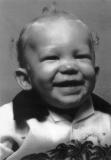 Born April 21, 1954, in Bountiful, Utah, James Paige Morrison moved to Alaska in
1963.
Born April 21, 1954, in Bountiful, Utah, James Paige Morrison moved to Alaska in
1963."From the age of 9, I grew up here, and this is where I think of as home," Morrison said emotionally to the overflow crowd at the E Street Theatre in his hometown, Anchorage, at a screening of his first short film, PARKING. "I wouldn't be who I am if it weren't for the people here."
One in a family of six children, Morrison remembers only rare fishing trips with a father whose road construction job kept him away from his family much of the time.
"He was an office manager in Anchorage, Alaska, and from the time I was 14 he always gave me jobs as a laborer on the road crews building the highways through Alaska. It was hard work, but I appreciate my father for doing that because from it I certainly developed, I think, a strong and valuable work ethic."
Morrison credits his Little League coach Felix Martinez for "everything I learned about sportsmanship, discipline, self-respect and respect for others." As Martinez teased Morrison from the audience, Morrison lovingly introduced him as one of the most important people in his life.
Dreams of acting came early, "I remember seeing movies when I was a kid and acting out every part on the way home. I remember acting like a goon around people I really, really respected in order to get their attention and they would invariable say, 'What's wrong with this boy?'"
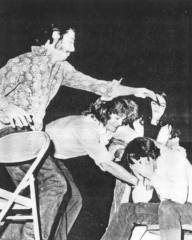 A loner as a teenager, with disdain for authority,
Morrison soon discovered theatre at West High and found like souls with a similar bend for
pretend.
A loner as a teenager, with disdain for authority,
Morrison soon discovered theatre at West High and found like souls with a similar bend for
pretend."How many times did I quit school?" Morrison asks rhetorically. He says it was a few times. He started at West High, went to Save (an alternative educational program), back to West, then back to Save, then out altogether.
"The public school system and I just didn't... basically, (we) had a personality conflict. I was looking for alternate realities as opposed to the one I had to deal with."
"Now when I look back on it, it was mostly just the fact that I didn't feel a part of what was happening around me, and I didn't know how to become a part of it."
"I was very shy then, and people misread that... people would read my introverted personality as a brooding, intense, psycho killer sort of thing, and it wasn't that at all. I was terrified of everything."
While in the Save program, he decided he wanted to be a psychologist and enrolled in psychology classes at Anchorage Community College. Later, when he returned for a time to regular school programs at West, he entered his next role, that of peer counselor.
"I could understand the kids. I knew exactly what they were thinking without them having to open their mouths, because I was one of them."
Morrison's mother convinced him to try out for a play at the Anchorage Community Theatre. He auditioned and won a part, finally finding a place he felt he could belong. Morrison's first role was Pope in A CRY OF PLAYERS.
Then Morrison made an unusual move, he quit the high school football team to don a toga, and he dyed his naturally blonde hair even blonder to portray Hero, the romantic lead in the play, A FUNNY THING HAPPENED ON THE WAY TO THE FORUM. He also played Troilus in A TIGER AT THE GATES while still in high school.
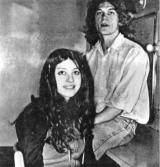 Then, midway through his senior year, he quit high
school altogether, took the tests to earn his diploma and signed up for drama classes at
ACC.
Then, midway through his senior year, he quit high
school altogether, took the tests to earn his diploma and signed up for drama classes at
ACC.During the early 1970's, Morrison made a name for himself in these local theatre productions, including playing the lead, Jesus Christ, in a local production of GODSPELL.
"I embraced the theatre community and the family it offered. It was a different group of creative personalities. It really does have a lot to do with searching for an alternative reality."
Buoyed by his success here, at 21, Morrison packed his bags and for the next few years traveled outside, in the southern United States. He visited New York with an eye on enrolling in a serious drama school. He appeared as Jack in Direct Theatre's production of JACK, OR THE SUBMISSION.
During this time, continuing his exploration, Morrison traveled the country working as a clown and wirewalker for the Carson and Barnes Wild Animal Circus.
He would also journey twice to the Salt Lake City area working in the "alternative" Theatre 138 and the fledgling Salt Lake City Acting Company. He has been involved with the Salt Lake Acting Company almost from the first, including its Eliot Hall days when it was located at The Glass Factory in Arrow Press Square.
But when nothing panned out, he returned to his native Alaska in 1978 where he met Robert Farley, co-founder and former artistic director of the Alaska Repertory Theatre Company. Farley asked Morrison to join the Rep's apprenticeship program. For two seasons Morrison worked both the technical and the creative side of the theatre, building sets and, at the same time, starring in a number of early Rep productions including DIAMOND STUDS, A CHRISTMAS CAROL, and THE TAMING OF THE SHREW.
After graduating from the Alaska Repertory Theatre's Professional Training Program, he would return to Utah, to Salt Lake City.
"I love being here. It is a wonderful environment to work in, not the pressure that exists in L.A. But the city does have a stigma. When I tell my friends in L.A. that I'm going to work in Salt Lake, they always ask me why would I do that."
Directing is something Morrison reserves for Utah. His first effort, THE HOLY GHOSTLY, was presented in 1977. He returned in 1981 for WOLVES, in 1987 for THE FOREIGNER, in 1992 for ABUNDANCE and again in 1993 for GREATER TUNA.
Sadly, it was shortly after Morrison began rehearsals for his early directorial effort, WOLVES, that he received word that his father had died suddenly. He left the night after the opening to be with his family.
"This play is a release for me... an expression of my anger and my resentment at death and yes, it is also a play which is life... it is living. There are those moments that make you aware of your vulnerability, and that is important to me."
"That is why I'm in theatre. That is why the arts, any of them, are so important. They serve as a creative outlet."
In 1982 he decided to make his living as an actor and made the fateful move to Los Angeles.
He spent two years as an understudy and in supporting roles before landing his first starring role in Tennessee Williams' Pulitzer Prize winning masterpiece, CAT ON A HOT TIN ROOF, directed by Jose Quintero at the Mark Taper Forum for which Morrison won his first Drama-Logue Award.
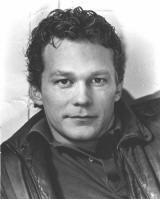 Besides several television roles including AUTOMAN, HOUSTON KNIGHTS, ONCE A HERO, NORTH
AND SOUTH BOOK II, WEREWOLF and JESSE HAWKES, Morrison would travel for the next 5 years
from Minneapolis to Florida to Alaska to England playing regional theatres. In San Diego
he appeared at the Old Globe Theatre in productions of JULIUS CAESAR and RICHARD II.
Besides several television roles including AUTOMAN, HOUSTON KNIGHTS, ONCE A HERO, NORTH
AND SOUTH BOOK II, WEREWOLF and JESSE HAWKES, Morrison would travel for the next 5 years
from Minneapolis to Florida to Alaska to England playing regional theatres. In San Diego
he appeared at the Old Globe Theatre in productions of JULIUS CAESAR and RICHARD II.In the late '80's, Morrison won several awards for dramatic roles. In Lee Blessing's DOWN THE ROAD, as an arrogant serial killer, Morrison won another Drama-Logue award and was nominated for a San Diego Critics Circle award. In Raphael Lima's EL SALVADOR -- in which he played a nihilistic photo- journalist, Pinder -- not only Morrison won praise for his work at the 20th Annual Los Angeles Drama Critics Circle Awards, but also Rafael Lima won for writing and Jeff Seymour for direction. Morrison also picked up yet another Drama-Logue award.
It was in 1989 that Randy Stone, now 20th Century-Fox Television's senior vice-president of talent and casting first spotted Morrison playing "an ugly American type" in El SALVADOR. The play was particularly memorable for the actor. He not only won two awards for his performance, but also the heart of his future wife, Riad Galayini, who played a prostitute in the play. In addition, Morrison discovered that he had gained another friend and supporter in Stone.
"He saw the play, I think his estimate is 35 times, something like that," says the actor. "Since then he's been a supporter of mine and would bring me in to audition for things whenever he could. He happened to be casting SPACE: ABOVE AND BEYOND and called me in. I met with Glen Morgan and James Wong and then had to read for the network.
"In the show's pilot my character has a monologue he delivers to the troops in the last third of the script. That was my audition piece. When I read for the network it was in a room filled with around 20-25 people. I delivered the orders directly into their eyes, as it were; it sort of gave me an advantage. I think it actually put me in a position of power because it was as if I really were their commanding officer."
The network was sufficiently impressed with Morrison's commanding presence, and the actor was offered the role of McQueen that night.
When SPACE: ABOVE AND BEYOND first began, McQueen was a bit of an unknown quantity. Although audiences eventually got the opportunity to look behind the character's steely gaze and find out more about him, it was this sense of mystery, which first attracted Morrison to the role.
"He's the enigmatic bad-ass, if you will, who emerges from the fog, shakes things up and then splits," chuckles the actor. "This type of character has appeared throughout history, certainly in more recent genres like westerns. I've always been fascinated by the guy who comes down from the mountain, saves the town and then goes back up the mountain and no one ever hears from him again. He's the archetypal quiet stranger of few words. That's what appeals to me about McQueen, and that's what I saw first."
"When I was in my early twenties I decided to become an actor and since then I've held all sorts of jobs as most actors do -- truck driver, waiter, furniture stripper, landscaper (he was also an aerobics teacher and a busboy), all that stuff. I haven't had to work a civilian job like that for a while. I've been lucky enough for the past 10 years or so to be making my living as an actor but with varying degrees of success. For me SPACE: ABOVE AND BEYOND was by far the most lucrative opportunity I'd had."
Morrison made many notable television guest appearances in the early '90's including such shows as QUANTUM LEAP, L.A. LAW, and FRASIER.
"I've been acting a long time. I have been working with the finest writers, directors and actors in the business for a long time -- and I am now. So it is no different than it ever was. I am making more money than I was. That's a reward and I am grateful for it, but that's not what it's about. I am from the theatre. It is not about money. It never has been."
When asked "if you had to choose one thing to do for the rest of your life, what would it be," Morrison answered, "It's like, what would you wish for if you had three wishes, 'uh world peace, and...' I mean, I want to say that my first inclination is 'well, kind of a service thing,' but actually, the first thing that came to my mind was to play golf." He laughs.
"But that's not very altruistic, is it? I really enjoy acting a lot. I'm just talking about working stiffs now -- the guys who just get the job after job and are workers among workers. I'm not talking about the upper echelons of people who can actually choose between 10 or 12 scripts that come in. Most of the stuff that we do to make a living is substandard work on several levels, and it's awful. But I do enjoy it regardless because, after all, for 10 bad things that you do, you get to do that one good thing that really speaks to your soul. I enjoy my work a lot."
The time constraint of television work is yet another challenging aspect of acting. "It's tough to do it all in 46 minutes. Like any ambitious TV project, you're lucky if, out of whatever you do, you feel you've fully realized a mere fraction of what is required of you. And I'm strictly speaking for myself here. (Choreographer) Martha Graham said in a letter to (Choreographer) Agnes De Mille, 'You don't have to believe in yourself or your work. You have only to be open. There is no satisfaction whatever at anytime. There's only a queer, divine dissatisfaction.' I agree with that. Getting beyond thinking about the concepts of 'good' and 'bad' is the most challenging aspect of any work considered meaningful."
In February 1996, the Road Theatre Company produced his first original play, IDLE WHEELS, in North Hollywood (it was first done by the Salt Lake Acting Company in 1986). Morrison says the play pays homage to his home state of Alaska. Central to his characters' experiences is "the enormity of the place, the mysticism of the physical environment."
But more germane than the Alaskan panorama is the cultural influence of its native inhabitants, the Inuits, who represent conglomerates of separate Eskimo traditions, Morrison said. The play's main character, Buzzy Greybill, becomes fascinated with these traditions and seeks to appropriate them as his own. It is the conflict engendered by the young man's adoption of these traditions vs. his failure to understand them that fuels the play's dynamic.
"In his case, he's trying to possess something other than what he already does," Morrison said. "If you are trying to own something that you already possess, that's insanity."
IDLE WHEELS made its way to the Road Theatre Company via Morrison's association with director Richard Herd, whom he met when they worked together at the Classical Theatre Lab in L.A. Originally written in 1984, it has changed four times since then.
"I think it's because it's my first and it will never ever really be finished, and I just sort of have to stop and let it be what it is," mused Morrison. "It's my first play, and I know what its flaws are.... I have no desire to correct the flaws. It is hard for me to tell whether the problems are in the people I wrote about or in the structure. I don't feel as if this is a showcase for my writing."
"I grew up in Alaska. This play is a love poem to the place I grew up. But because I was so confused and embittered and angry at the time that I grew up there, this is the perspective that I wrote from.... The character is not close to me except for the confusion of how to make the next step into productive adolescence."
The play came about during his tenure as an actor at Robert Redford's Sundance ranch where he worked as an actor developing new plays.
"After working a few years at Sundance I decided to write about people I knew and a place I knew. And, at the time, I was discovering a new spiritual foundation that I had discovered was missing from my life."
"I sat on the play from 1987 to '92. I would sit and wonder, 'Why aren't people responding to my work as a writer?' It occurred to me that it might be because no one was being exposed to it. So I started sending it out and now have quite a collection of rejection letters."
He decided it was time to look into a local production. When he showed it to his friend Richard Herd and received ecstatic feedback, he knew it was time. At first, Morrison thought Herd would be perfect for a role in the play, but Herd saw something else. He wanted to direct it.
"I have distanced myself. I talked to some of the actors. But I am not part of the process so much. It is theirs now. I have moved on and written several other plays since and am working on some now and doing other things. I trust Richard to guide this thing and realize this thing as if I were working by his side."
As to his impetus to write, Morrison says, "I think it's the same as the impetus to make a pot or to be a woodcarver. It's just to create something that you want to live (on) without you."
IDLE WHEELS ran while Morrison was still filming SPACE: ABOVE AND BEYOND. During one of the later episodes of SPACE, Morrison injured himself on the set. In back to back episodes, first he tore a ligament while dismounting the tank in "Pearly," then, as his leg failed him in an attempt to stand in "R&R," he cracked a rib. This event influenced his options after SPACE ended.
"For the first three months after we wrapped the series (SPACE), I was in recovery from knee surgery. The MILLENNIUM episode I am filming right now here in Vancouver is the first job I've done since then. I just took it easy rehabbing for about two and a half months."
"Because I waited so long to have the reconstruction of the ligament, my leg had atrophied quite a bit, and it took a little longer than it might have to build it back up. I was quite concerned about the physicality of this MILLENNIUM part, but Thomas Wright is directing it -- he did five or six episodes on SPACE, including some of our best ones like 'Stay With the Dead' and the last episode. So we worked it out, and it didn't turn out to be a problem."
MILLENNIUM has received much criticism for its dark overtones and "bleak" outlook.
"'Bleak' was never something I thought. I did think 'horrifying.' I saw a lot of hope, actually, in the relationship Black has with his family, especially his little girl. In our episode, the reason behind a lot of this is a concern for the safety of the innocent in this world."
"When I first read the script I thought back to a conversation I had with Glen about his reaction to a documentary that some friends of ours had made. It was about three boys in Memphis, Tennessee, who were convicted of the murders of some other children. After the screening he said to me, 'All I could see were the faces of my own kids.' He personalized the experience, and it became so important to him that he and James Wong ended up writing a script about it."
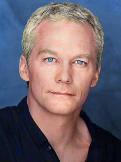 When asked, "what was his initial reaction to
the subject matter he would have to be dealing with in the episode," Morrison
answered, "I approach any dark subject matter with a certain degree of humor. That's
a way to protect myself from the feelings that I'm called upon to explore. I think that's
true of most people. I remember going through the deaths of both my parents. There are six
siblings in the family, and we spent a lot time together just exploring the depths of our
humor, which helped us, get through the whole grieving process. It's tough to do something
like that in a show like MILLENNIUM because you don't want to appear to be
irreverent."
When asked, "what was his initial reaction to
the subject matter he would have to be dealing with in the episode," Morrison
answered, "I approach any dark subject matter with a certain degree of humor. That's
a way to protect myself from the feelings that I'm called upon to explore. I think that's
true of most people. I remember going through the deaths of both my parents. There are six
siblings in the family, and we spent a lot time together just exploring the depths of our
humor, which helped us, get through the whole grieving process. It's tough to do something
like that in a show like MILLENNIUM because you don't want to appear to be
irreverent."Shortly after wrapping his MILLENNIUM episode, Morrison traveled to Princeton, New Jersey, to perform on stage in a contemporary tragedy, THE MAI. Twice before Morrison has ventured here to appear in other McCarter Theatre productions including CAT ON A HOT TIN ROOF in 1992 and a short plays festival, WINTER'S TALES '94. Emily Mann directed all three productions.
"I always wanted to come back and work with Emily again," said Morrison. "I also did STILL LIFE (which she wrote) with her in London 10 years ago. Plus, I think we knew each other in a another life."
In Morrison's lifelong quest for truth, he delivers. "Over the years I think I've written 5 full length plays and 9 short plays." Two of these short plays have been made into short films. PARKING was Morrison's first film.
"PARKING started from a short play that I wrote when I was a member of the Los Angeles Playwright's Group. It's based on an experience my wife and I had in a crowded parking garage where someone parked behind us and trapped us in our space. After 35 minutes the person finally showed up and I launched into a 20 (minute) monologue. The film is an examination of urban etiquette and the cement-and-steel belligerence of humiliated testosterone in an urban parking structure -- all in 10 minutes and 36 seconds."
The play was very well received, and Morrison knew it must have a continued life. Morrison directed, and his wife produced the short film of PARKING.
PARKING has been screened at more than 20 film festivals worldwide. Screenings included the New Directors/New Films at the Museum of Modern Art, Austin's South by Southwest Festival, Taos Talking Picture, the Montreal World Festival, the Cork International Film Festival, and the Los Angeles Independent Film Festival and the Palm Springs International Film Festival. Finally, the new fringe festival of the Sundance Festival, Slam Dance, where it received the Audience Choice Award for best short film.
"Slam Dance is the second year of a festival formed to counter the more established Sundance Festival. It takes place in Park City at the same time as Sundance. It is like Fringe Festival in Edinburgh. It is very small at this point. It was formed by a bunch of fellows who were turned down by Sundance and felt their films should be showing. So they created this. Their motives are obvious; they wanted an alternative to what had become main stream. That's how off-Broadway was created. Sundance had been the alternative to Hollywood, and now it has become Hollywood."
Ultimately Sundance did not ignore PARKING. A veteran of the Acting Company at the Sundance Institute's Playwrights Lab since its inception in 1980, Morrison had his work shown on the Sundance Channel in 1997.
Morrison is still a student of acting under the tutelage of Harry Mastrogeorge in Los Angeles. A strong work ethic, humility and a willingness to serve the story are fundamental elements in Morrison's approach to acting.
Learning self-sufficiency is the core of what he teaches other actors. While other acting classes are filled with fluff and throwaway "wonderful darling" compliments, Morrison rarely praises his students, training them instead to depend on self-evaluation.
"I make the story the most important thing," Morrison explained. "I don't make the story serve me. I serve the story. To do your best, you are going to be as selfless and as thorough as you can be. The task is more important than your own ego."
"At first, I didn't identify with the warrior in McQueen. The worker, yes, but not the warrior. But, then I realized to be an artist you have to be a warrior. You have to fight through the rejection. The battle to find proper validation, which hopefully would come from within anyway, that battle is eternal with the artist."
Filmed in late 1997, Morrison completed his second short film, NUDE DESCENDING, in early 1998. This film is about a generous friend who agrees to substitute for another in a life studies art class. The friend's panic-laden thoughts while posing nude are the subject of the film. This time writing, his wife directing and producing, Morrison also makes a brief appearance in the film.
Morrison continues working in theatre, television, radio and movies. For an up-to-date list of his projects, go back to the Lobby and select "JM Projects in 2005."
This article was created from synopsized interviews listed below.
Cyberspace Vanguard, uncredited
Steven Eramo for Cult Times
Steven Eramo for TV Zone
Bill Florence for Starlog
Nancy Funk for The Salt Lake Tribune
Michael Kearns for Drama-Logue
Deborah Klugman for L.A. Life Weekend
Nancy Melich for The Salt Lake Tribune
Tom Provenzano for Drama-Logue
Kim Rich for The Anchorage Daily News
Kathleen Toth for DreamWatch
The Princeton Packet, uncredited
